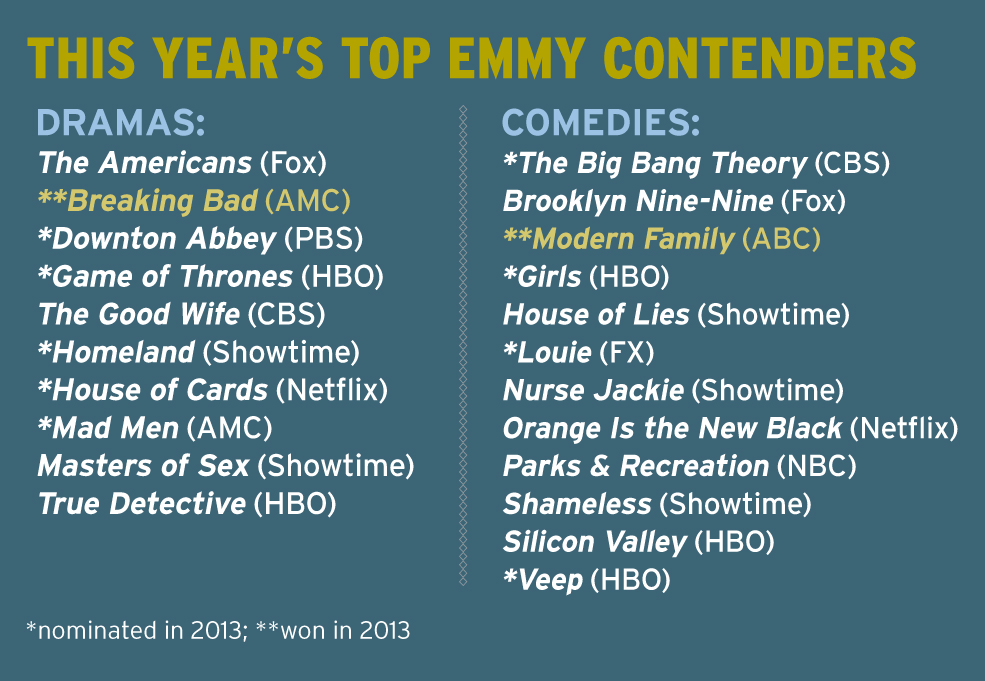Limited Run, Unlimited Quality—Big Choices

The smarter way to stay on top of broadcasting and cable industry. Sign up below
You are now subscribed
Your newsletter sign-up was successful
In what is widely being called a new golden age of TV, is it fair to pit a premium program such as HBO’s True Detective against a broadcast gem like CBS’ The Good Wife? Should a show that is only partly a comedy, such as Netflix’s Orange Is the New Black, compete against a show that is almost as traditional as a sitcom gets, CBS’ The Big Bang Theory?
These are the questions the Academy of Television Arts & Sciences (ATAS) is struggling with headed into this year’s Emmy Awards nomination process. The full list is set to be announced July 10; the primetime Emmys will be handed out a month earlier than usual, on Monday, Aug. 25, due to NBC’s conflicting primetime NFL football obligations on Sundays.
Dramatic Tension
The first season of HBO’s True Detective— headlined by two movie stars, this year’s Best Actor Oscar winner, Matthew McConaughey, and two-time Academy Award nominee Woody Harrelson— aired just eight episodes. When the show returns for season two, it will star new actors and feature a new story, unlike most dramas, which tell open-ended stories over several years.
But according to Academy rules, any drama that includes a “created by” credit qualifies as a drama, says John Leverence, ATAS senior VP of awards. In True Detective’s case, HBO elected to leave the show in the drama category rather than asking to have it considered as a miniseries.
This issue of how to classify a program is popping up more and more. PBS’ Downton Abbey first competed as a miniseries, which is what the show was when it premiered on PBS. However, the series became such a phenomenon that backers Carnival Productions, WGBH Boston and PBS’ Masterpiece Theater turned it into a regular drama series, and the show moved into that Emmys category.
The depth of dramas on television today is making Emmy’s outstanding drama category more competitive than ever. AMC’s Breaking Bad, widely considered to be one of the best shows ever produced for television, is back seeking its fifth and final nomination after finally winning the statue last year.
The smarter way to stay on top of broadcasting and cable industry. Sign up below
“Breaking Bad took its victory lap last year, but the last half of that show’s final season is eligible this year,” says Leverence. “Last year almost seemed like we were bidding a fond farewell to Breaking Bad, but it could definitely be back in the winner’s seat this year.”
Facing off against Breaking Bad and True Detective in the drama category will likely be HBO’s Game of Thrones and Netflix’s House of Cards, with a couple of upstarts, FX’s The Americans and Showtime’s Masters of Sex, making good cases for their inclusion.
Many critics consider CBS’ The Good Wife to have turned in its best season ever in season four, making that show hard to overlook. And AMC’s Mad Men, now in its seventh and final season, is likely to be nominated again. Other shows that have been previously nominated, such as Downton Abbey and Showtime’s Homeland, are less certain of earning nominations this time around.

Making Sense of Humor
This issue of how best to define programs also is affecting comedies.
This year, Netflix is entering Orange Is the New Black as a comedy. While the show has its funny moments, an equally strong argument could be made to consider it a drama. John Wells, executive producer of Showtime’s Shameless, asked the Academy to move his show into the comedy category, even though previously it has been considered a drama.
ABC’s Modern Family will be back, contending for its fifth Emmy win in the category of outstanding comedy, which would tie the show with Frasier as TV’s most-honored sitcom. Also likely to be back are HBO’s Veep and Girls, CBS’ The Big Bang Theory and FX’s Louie. With NBC’s 30 Rock having wrapped its run, there’s an open slot that could be filled by any number of contenders, including Fox’s surprise Golden Globe winner Brooklyn Nine-Nine, NBC’s Parks and Recreation and new HBO entry Silicon Valley.
Contributing editor Paige Albiniak has been covering the business of television for more than 25 years. She is a longtime contributor to Next TV, Broadcasting + Cable and Multichannel News. She concurrently serves as editorial director for The Global Entertainment Marketing Academy of Arts & Sciences (G.E.M.A.). She has written for such publications as TVNewsCheck, The New York Post, Variety, CBS Watch and more. Albiniak was B+C’s Los Angeles bureau chief from September 2002 to 2004, and an associate editor covering Congress and lobbying for the magazine in Washington, D.C., from January 1997 - September 2002.

